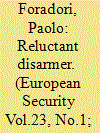| Srl | Item |
| 1 |
ID:
127826


|
|
|
|
|
| Publication |
2014.
|
| Summary/Abstract |
Transparency, international credibility, democratic accountability, a new realism in defense expenditures - these basic policy goals fit awkwardly with the current deployment of nonstrategic nuclear weapons (NSNW) on Dutch territory. Most parties in the Netherlands want the NSNW removed. Some are even willing to challenge the idea that only consensus among all 28 NATO Allies can lead to the removal of the NSNW. The new Dutch minister of foreign affairs for example, Frans Timmermans, has a long track record of calling for an end to the deployment of US nuclear weapons on Dutch territory. Without NATO consent if necessary. His appointment fits with the political shift that we have seen over the past few years in Dutch politics. This article looks at the political rationale behind that shift: who are the main political actors involved? How have domestic and international pressures influenced party positions? The article also looks at the possibilities a new Dutch Government has were it to challenge the NATO consensus on NSNW. Would the USA refuse to take the NSNW away? How would NATO react and what could mitigate Allied concerns?
|
|
|
|
|
|
|
|
|
|
|
|
|
|
|
|
| 2 |
ID:
115776


|
|
|
| 3 |
ID:
127825


|
|
|
|
|
| Publication |
2014.
|
| Summary/Abstract |
Of the five North Atlantic Treaty Organization (NATO) European countries of US nuclear forward deployment, Italy is the least-known and studied case, even though the country hosts the largest number of US nonstrategic nuclear weapons (NSNWs) and still has two bases of deployment. The paper aims at filling this gap by analyzing Italy's current view on the presence, value, and future of NSNWs hosted on its territory. The analysis begins with the examination of the process of profound devaluation that has minimized, starting from the end of the cold war, Italy's original interest in this category of weapons. It then examines the reasons why Rome continues to pursue conservative nuclear weapon policies and distances itself significantly from the progressive camp of NATO members, particularly Germany, that explicitly call for the withdrawal of US NSNWs from Europe. Through the study of the Italian domestic politics and security culture, the article explains Italy's opposition to any radical change in the NATO nuclear status quo, and its reluctance to pursue policies that are consistent with the process of nuclear devaluation that the country has experienced over the past two decades.
|
|
|
|
|
|
|
|
|
|
|
|
|
|
|
|
| 4 |
ID:
127838


|
|
|
|
|
| Publication |
2014.
|
| Summary/Abstract |
This article analyses the potential motivations behind the opposition of a number of Central and Eastern European States (CESs) to the withdrawal of US deployed nonstrategic nuclear weapons (NSNWs) from Europe. It shows why CES governments obtain no military benefits from the deployed NSNW; it argues CES are unlikely to truly see them as a promising bargaining chip; it suggests CES can derive only limited prestige from US-deployed weapons and the contrasting norm of 'nuclear disarmament' likely offers a more attractive option; and it assesses potential bureaucratic interests as improbable to play a decisive role. In contrast, the article proposes a more nuanced elaboration of the transatlantic 'linkage' argument. It maintains CES have significant motives to keep the United States involved in Europe, shows how they are likely to mistrust US commitment pledges, and argues they are prone to use the NSNW debate as a convenient instrument (within a limited toolbox) towards locking in the US foothold on the continent.
|
|
|
|
|
|
|
|
|
|
|
|
|
|
|
|